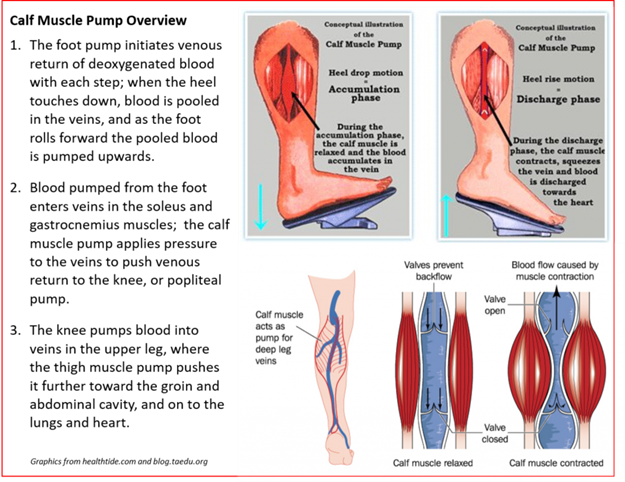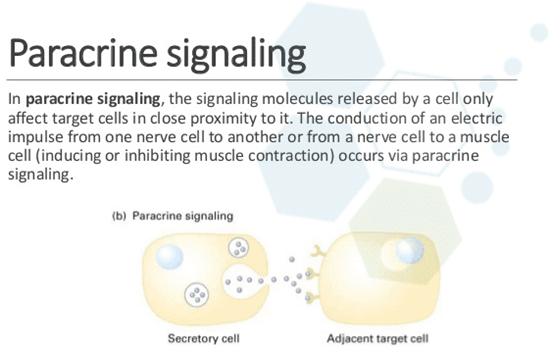Doctors suggest that during long periods of sitting, you should flex and extend your feet at the ankles periodically and squeeze your calf muscles to assist with blood circulation.
Why would non-exercise muscle contraction affect blood flow and cardiovascular health?
Contraction of muscles stimulates the arteries to vasodilate, reducing blood pressure.
Contraction of muscles itself increases heart rate and burns calories, keeping the heart strong and assisting in maintaining a healthy weight.
Contraction of the leg muscles stimulates baroreceptors to signal the autonomic nervous system and decrease blood pressure and heart rate from multiple fronts.
Contraction of the leg muscles squeezes leg veins, which function as a pumping mechanism to return deoxygenated blood to the heart.
The Correct Answer is D

This helps prevent blood pooling and clotting in the lower extremities, which can lead to deep vein thrombosis and pulmonary embolism.
It also reduces the workload on the heart and improves blood circulation throughout the body.
Choice A is wrong because contraction of muscles does not stimulate the arteries to vasodilate, but rather causes vasoconstriction in the inactive tissues to divert blood flow to the active muscles.
Choice B is wrong because the contraction of muscles itself does not increase heart rate significantly unless it is part of an aerobic exercise that elevates the metabolic demand.
Burning calories and keeping the heart strong are benefits of regular physical activity, not occasional muscle contraction.
Choice C is wrong because contraction of the leg muscles does not stimulate baroreceptors, which are pressure-sensitive receptors located in the walls of the arteries.
Baroreceptors respond to changes in blood pressure and signal the autonomic nervous system to adjust heart rate and vascular resistance accordingly.
Contraction of the leg muscles does not affect blood pressure or heart rate directly but rather assists with venous return.
Nursing Test Bank
Naxlex Comprehensive Predictor Exams
Related Questions
Correct Answer is C
Explanation
It explains that the primary immune response produces antibodies within five to ten days of exposure to antigens, while the secondary immune response produces antibodies within a day or two of subsequent exposure to the same antigen.
This is because the primary immune response involves the activation and differentiation of naive B cells into plasma cells and memory cells, while the secondary immune response involves the rapid activation of memory cells into plasma cells.
Choice A is wrong because the primary and secondary immune responses can occur in both children and adults.
Choice B is wrong because the primary immune response is slower than the secondary immune response in producing antibodies.
Choice D is wrong because both primary and secondary immune responses are important for the body’s ability to protect itself from pathogens.
The primary immune response generates immunological memory, while the secondary immune response provides a faster and stronger response to repeated infections.
Correct Answer is D
Explanation
Paracrine secretions are chemical signals that affect only nearby cells.

They are released by the sending cell and diffuse through the extracellular space to the target cell, which has a specific receptor for the signal.
Paracrine signaling is a form of local signaling that occurs in multicellular organisms.
Choice A is wrong because autocrine secretions are chemical signals that act on the same cell that produced them.
Autocrine signaling is also a form of local signaling, but it involves cell signaling itself.
Choice B is wrong because endocrine secretions are chemical signals that are secreted into the blood and act at long distances.
Endocrine signaling is a form of long-range signaling that involves ductless glands that secrete hormones.
Choice C is wrong because exocrine secretions are non-hormonal substances that are secreted into ducts to the external environment.
Exocrine signaling is not a form of cell-cell communication, but rather a way of releasing substances such as sweat, saliva, or digestive enzymes.
Whether you are a student looking to ace your exams or a practicing nurse seeking to enhance your expertise , our nursing education contents will empower you with the confidence and competence to make a difference in the lives of patients and become a respected leader in the healthcare field.
Visit Naxlex, invest in your future and unlock endless possibilities with our unparalleled nursing education contents today
Report Wrong Answer on the Current Question
Do you disagree with the answer? If yes, what is your expected answer? Explain.
Kindly be descriptive with the issue you are facing.
